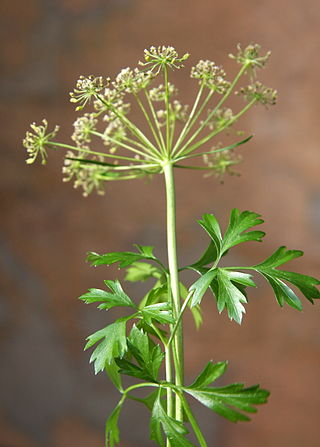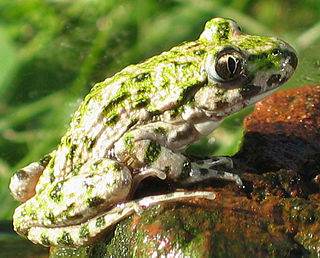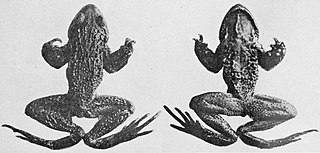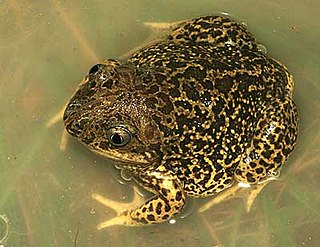
Apiaceae or Umbelliferae is a family of mostly aromatic flowering plants named after the type genus Apium and commonly known as the celery, carrot or parsley family, or simply as umbellifers. It is the 16th-largest family of flowering plants, with more than 3,800 species in about 446 genera, including such well-known and economically important plants as ajwain, angelica, anise, asafoetida, caraway, carrot, celery, chervil, coriander, cumin, dill, fennel, lovage, cow parsley, parsley, parsnip and sea holly, as well as silphium, a plant whose identity is unclear and which may be extinct.

Parsley, or garden parsley is a species of flowering plant in the family Apiaceae that is native to Greece, Morocco and the former Yugoslavia. It has been introduced and naturalized in Europe and elsewhere in the world with suitable climates, and is widely cultivated as a herb, and a vegetable.

The Mesobatrachia is a paraphyletic group of relatively primitive frogs. At the end of 2016, it contained 3 superfamilies, 6 families, 16 genera, and 244 species. Recognized as a group in 1993, the name is contrasted with the primitive Archaeobatrachia and the more diverse and advanced Neobatrachia.
François Marie Daudin was a French zoologist.

The parsley frogs or Pelodytidae are a family of order Anura. The family consists of a single genus, Pelodytes, which contains five species. These frogs can be found in south-western Europe and the Caucasus. The common name of "parsley frogs" comes from the common parsley frog which, because of its colouring, appears to be garnished with parsley.

Pelodytidae, also known as the parsley frogs, or rarely, mud divers, is a family of frogs. It contains a single extant genus, Pelodytes, and two genera only known from fossils. The extant species are found in southwestern Europe and the Caucasus.

The common parsley frog is a species of frog in the genus Pelodytes. It lives in the Iberian region of southwestern Europe. Its earliest identification is believed to be from 1802.

Tornier's frog is a species of frog in the subfamily Pelodryadinae. It is endemic to Australia.

The Caucasian parsley frog is a species of frog in the family Pelodytidae. It is found in Azerbaijan, Georgia, Russia, Turkey, and possibly Armenia. Its natural habitats are temperate forests, temperate shrubland, rivers, intermittent rivers, freshwater marshes, intermittent freshwater marshes, and freshwater springs. It is threatened by habitat loss.

The Iberian parsley frog is a species of frogs in the family Pelodytidae, known as "parsley frogs" because of their green speckles. This species is only found in Portugal and Spain; in Spanish it is known as sapillo moteado ibérico.

The Pelobatoidea are a superfamily of frogs. They typically combine a toad-like body shape with a frog-like, pointed face. Phylogenetically they stand between primitive frogs on the one side and higher frogs on the other and are therefore – among other things by characteristics of bone construction – in the suborder Mesobatrachia.
The common frog, also known as the European common frog and European common brown frog, is a semi-aquatic frog of the family Ranidae found throughout much of Europe including the British Isles.

Pelodytes atlanticus, the Lusitanian parsley frog, is a species of frog in the family Pelodytidae, known as "parsley frogs" because of their green speckles. This species is only found in Portugal.









